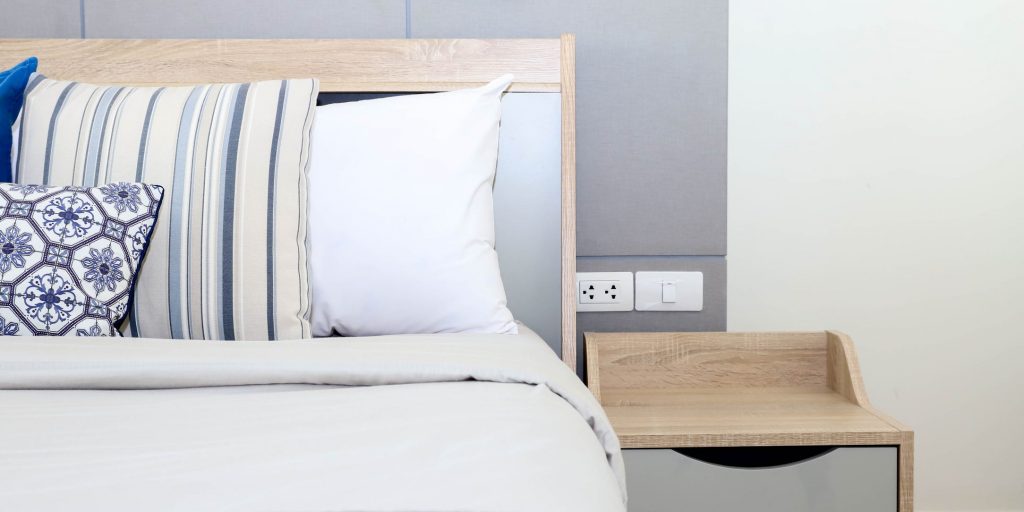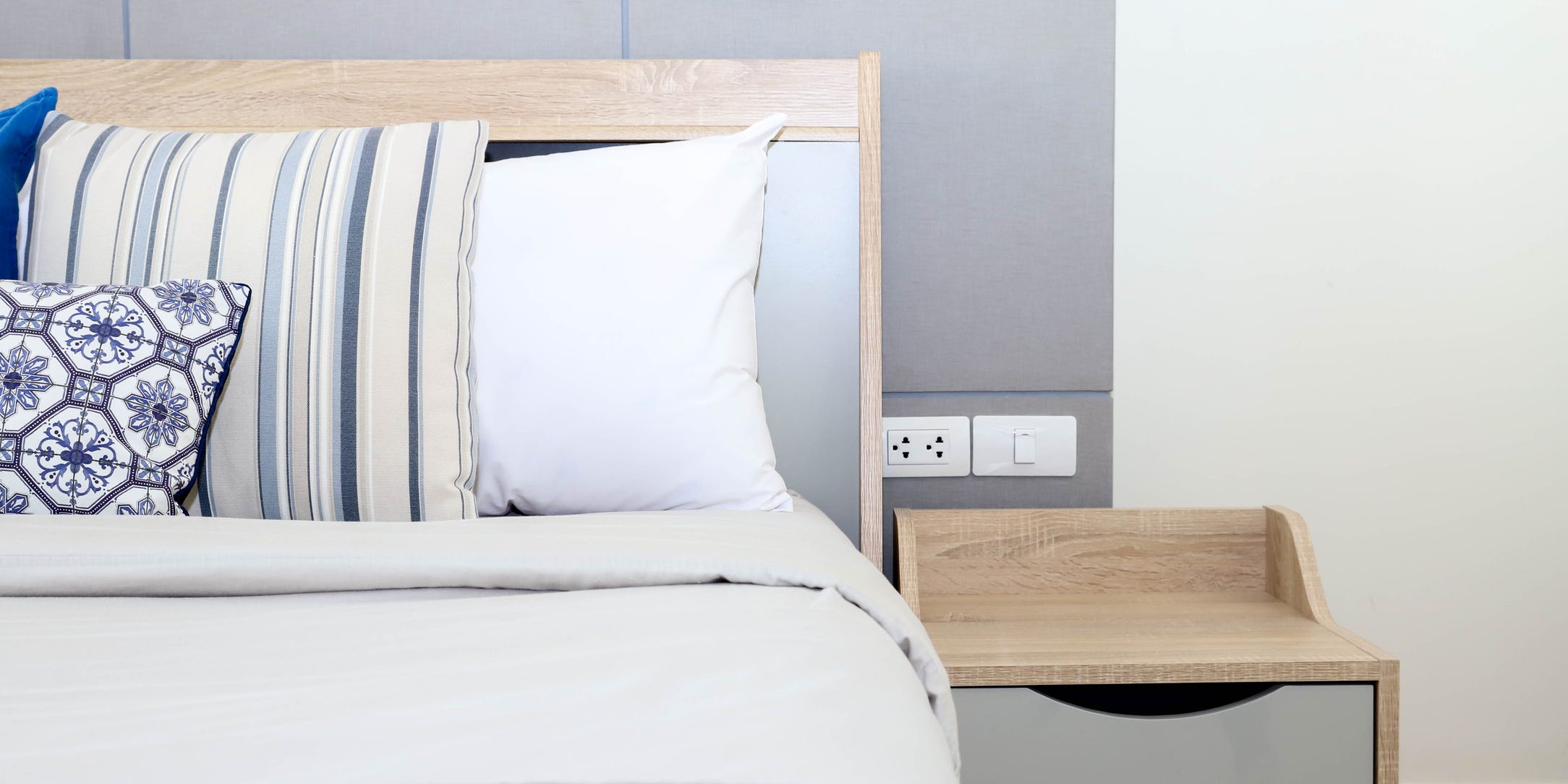
Kamonthip Kongnaka / EyeEm/Getty Images
- Feng shui harmonizes your environment to balance the flow of Qi, or energy.
- Positioning your bed auspiciously is the most important element of bedroom feng shui.
- Decorations in the bedroom should balance the five elements – earth, fire, water, metal, and air.
- Visit Insider's Home & Kitchen Reference library for more stories.
Feng shui is an ancient Chinese practice that influences the flow of life force energy, or Qi, to bring people into harmony with their environment. You can utilize elements of feng shui in your home by orienting furniture and placing objects to redirect the flow of Qi in an auspicious way.
Anjie Cho is a New York-based architect and interior designer who specializes in feng shui. "Feng shui examines how we shape our environment so it can support us rather than deplete us or make our life more difficult with obstacles," she says. "The bedroom is one of the most private spaces in the home. You spend a great amount of time sleeping in bed, in an unconscious, receptive state, and you absorb the Qi of your bedroom."
Qi nourishes us, and in the bedroom, feng shui can promote feelings of love, intimacy, and well-being, and even promote healthy sexual relationships. On the other hand, if the bedroom is unbalanced, this could create feelings of strife and discomfort. Cho shares her top tips for achieving a more harmonious bedroom here.
1. Pick supportive colors
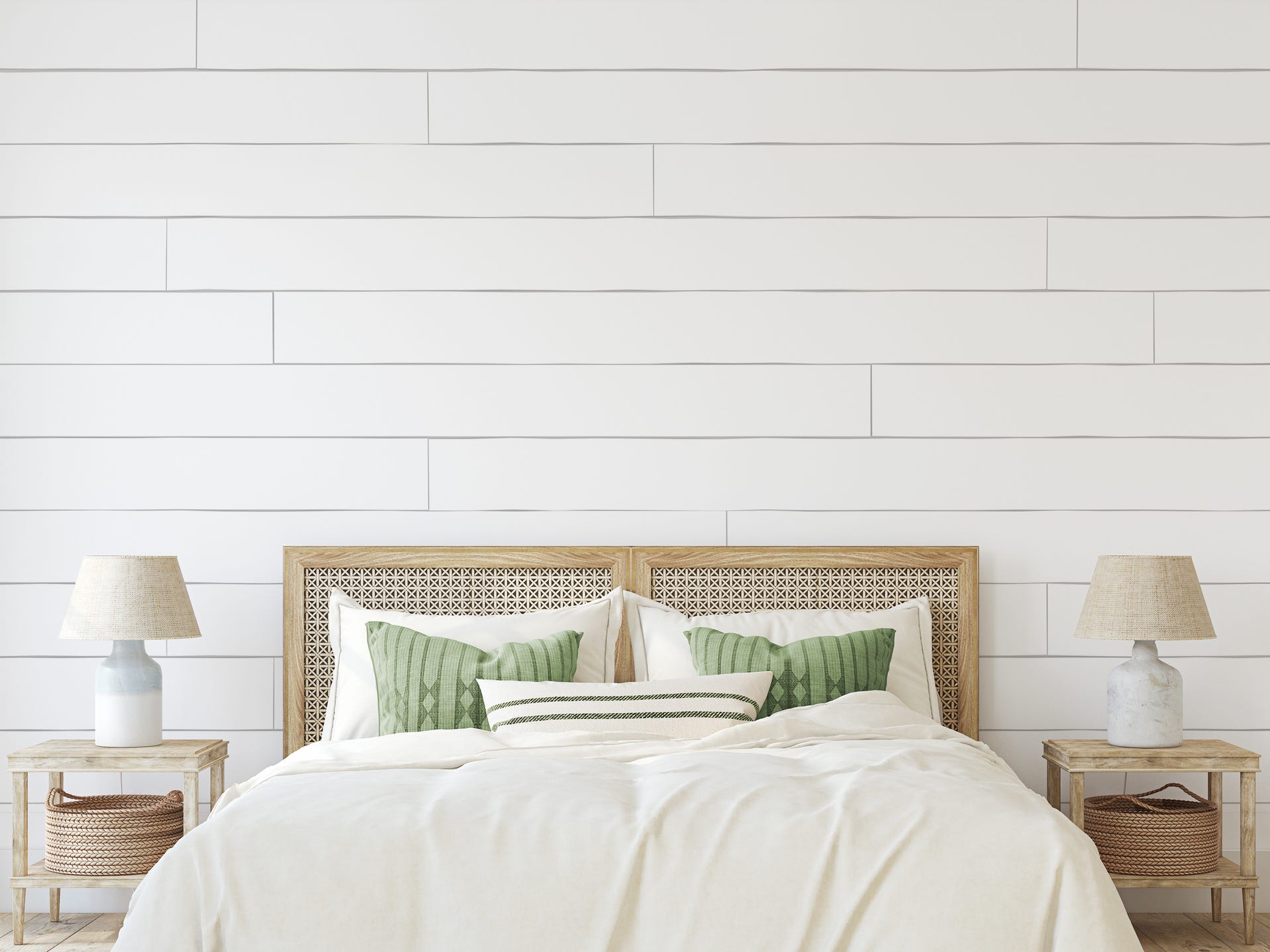
poligonchik/Getty Images
Your bedroom is a place of serenity and relaxation. According to the principles of feng shui, you should use earthy tones and colors, such as brown or white, to help inspire feelings of simplicity and groundedness.
"Wood element colors can be healing too, like blue and green, so long as they aren't too energetic," Cho says. "Avoid colors that are too bright or stimulating. Especially if you have trouble sleeping."
2. Position your bed properly
Put your bed in the "command position" facing the entry door. This helps to relax your fight or flight response.
"Command position means you want to be able to see the door while lying in bed, but not directly in line with the door," Cho says. Usually, this means you're situated diagonally from the door. When you're not able to see the door, your fight or flight response is activated because you're under a subtle level of stress.
3. Invest in a nice bed frame with a headboard
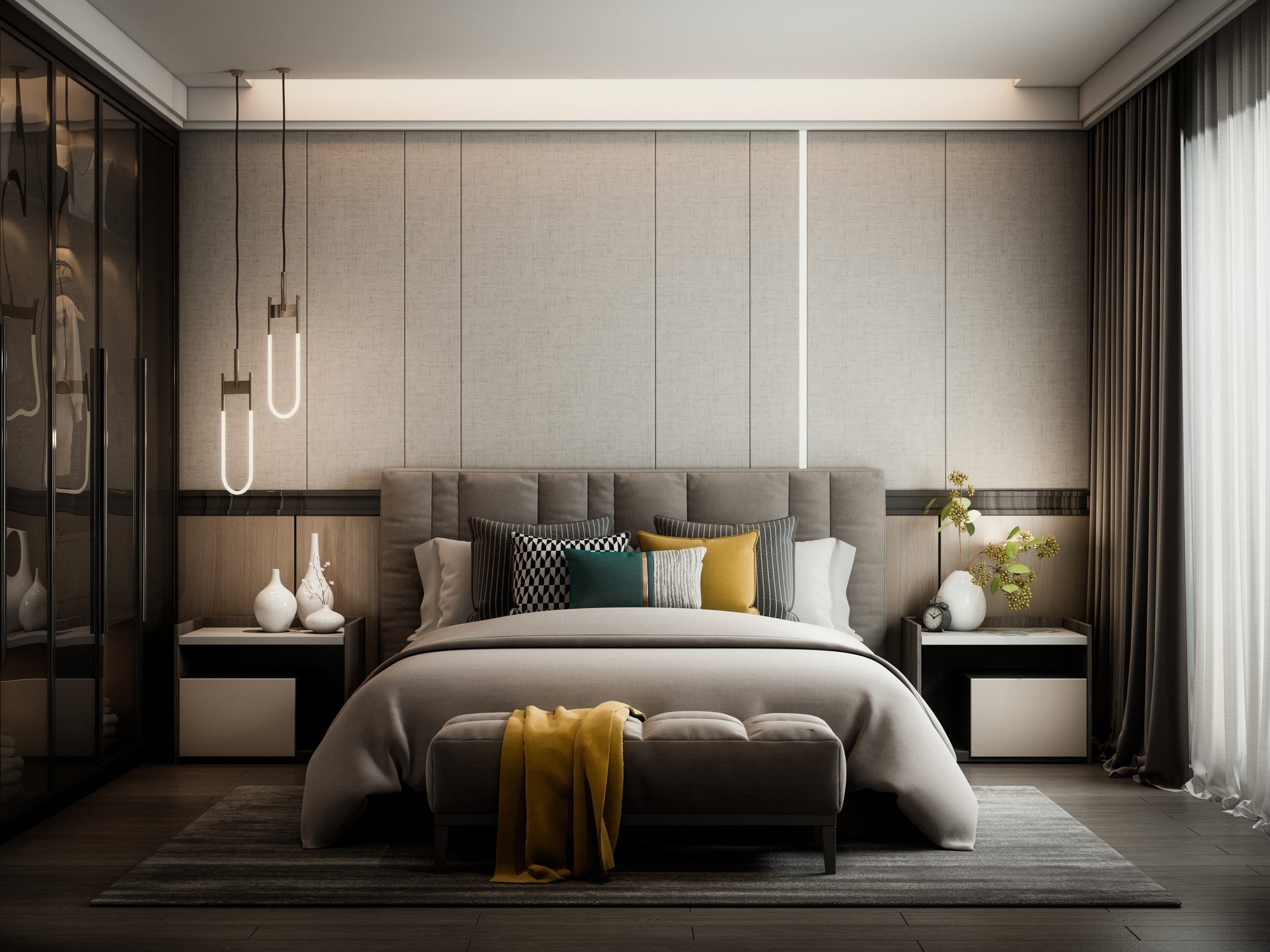
Bulgac/Getty Images
"You want to have the Qi flow around you," Cho says. When you have your bed right on the floor, there's no way for the energy to flow beneath you. An elevated bed allows for optimal energy flow and a headboard attached to your bed fosters a sense of security.
"A headboard represents stability in your life," Cho says. "It also represents connecting you with your partner or future partner. When people are in transition and not stable, they don't buy a headboard."
4. Don't store anything underneath your bed
"When you're in bed you're in a passive state," Cho says. "If you're sleeping over anything that's emotionally charged, like photos or letters from an ex, that can hold you back from moving onto a new relationship. You're literally sleeping over that energy every night."
Similarly, if you're sleeping over running shoes, that energy is focused on movement and could negatively impact your quality of sleep. Ideally you want nothing under your bed. If you have limited storage space, linens or pillows are OK.
5. Replace your linens annually
Try to invest in the highest quality, non-toxic linens that you can afford and replace them annually. "You have a lot of skin contact with your linens, and absorb that energy," Cho says. Bamboo sheets are a great choice for something that's breathable and silky soft.
6. Place the head of the bed against a wall with space on both sides
This balances your masculine and feminine energies, your yin and yang, and gives your partner space.
"Nobody wants to squeeze into the wall side of the bed and be trapped there," Cho says. "Otherwise it doesn't feel like a balanced relationship."
Even if you are happily single, having a bed pushed up against a wall creates an imbalance. Choose a smaller bed, and leave room on both sides. Having nightstands on both sides also helps to create a balanced environment to support a relationship or future relationship.
7. Stick to plants with soft, rounded leaves

Ali Majdfar/Getty Images
Plants strengthen the wood element in your bedroom, nurturing compassion and growth. Soft leaves promote a sense of healing. Don't have a cactus or prickly plant in your bedroom, especially if you struggle with internal aggression. For example, Cho has a golden pothos and spider plant in her bedroom.
8. Avoid too many books in the bedroom
It's alright to have a novel by your bedside if you read to fall asleep, but if you have a whole library in your bedroom, that stimulates your brain and could contribute to difficulty sleeping.
9. Don't block windows with your bed
Windows represent your eyes, and having something - like your headboard - blocking a window stimulates your fight or flight response. "You're very vulnerable if your back is to that, especially if you're on the ground floor," Cho says.
10. Don't place a mirror facing your bed
If you're superstitious, avoid having a mirror face your bed. "The superstition is that while you're sleeping, the spirit leaves your body, and it might go into the mirror and forget to come back to your body," Cho says.
Cho's BTB Feng Shui School believes that mirrors are okay in the bedroom so long as they aren't directly facing the bed. They can even be positioned to help you see the door in the reflection of the mirror if it's impossible to move your bed into the command position due to space constraints.
11. Control the lighting
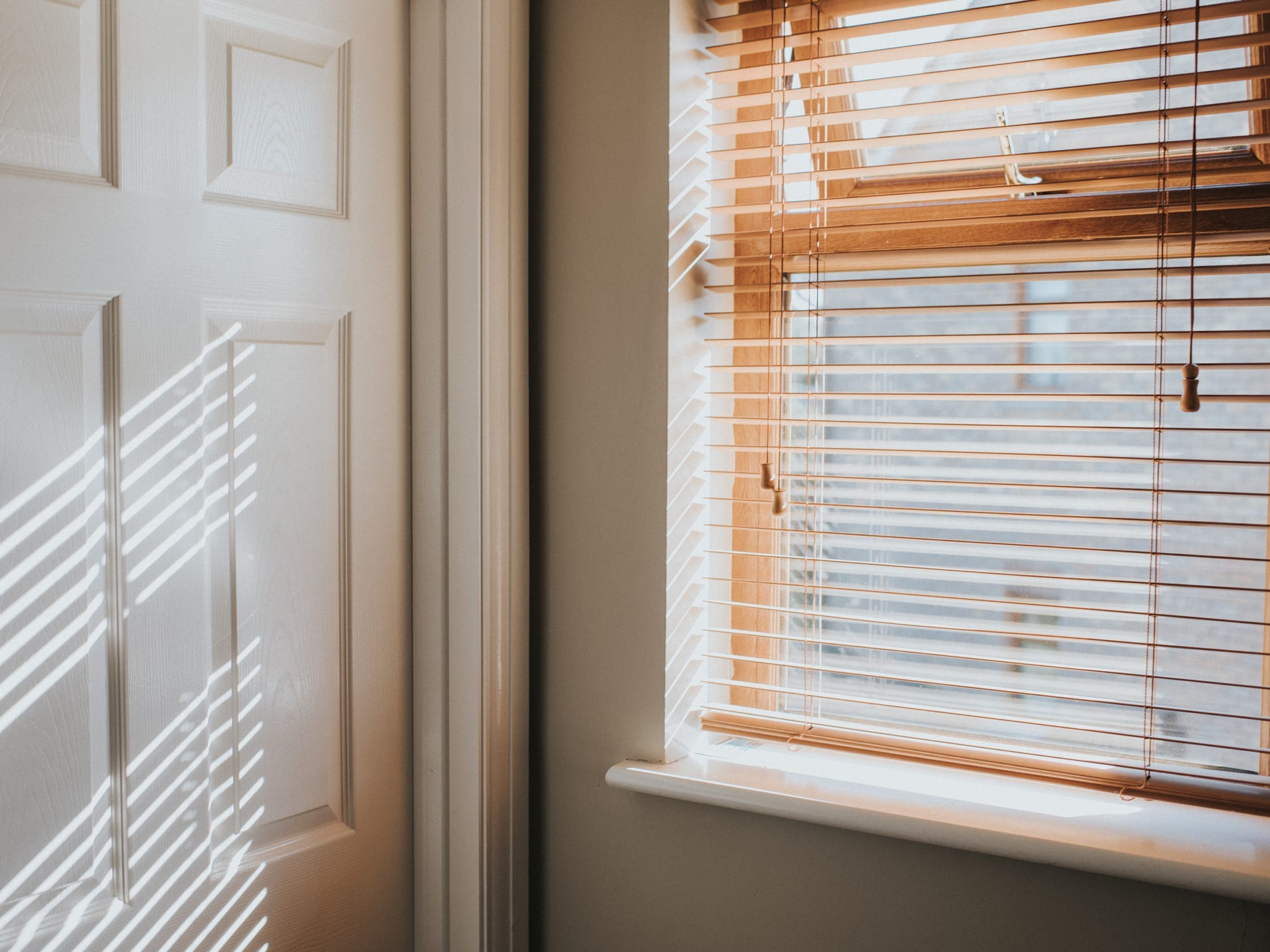
Catherine Falls Commercial/Getty Images
You want to be able to control the lighting, or fire element, in the bedroom with curtains or blinds. This allows you to create a yin environment that's dark enough to sleep in at night. "A lot of people don't have dark enough rooms to be able to sleep well," Cho says.
Window treatments can create acoustical insulation as well. During the day, you want to bring the yang energy of sunlight into the bedroom to clear out the space. Light fixtures that can be dimmed are helpful.
12. Clear energy from any second-hand items
If you have any second-hand objects in your bedroom, Cho recommends that you smudge or sage it, or leave it out in the sunlight to energetically recharge. Smudging involves lighting a smudge stick and moving it mindfully throughout the room or around an object to clear negative energy. It's important to clear these items with intention because they retain energy from past owners.
13. Don't bring your work into the bedroom
Blurring the separation between work and rest is dangerous. Don't bring your computer or other work items into your bedroom. "If you can see your computer from your bed, it's really easy to get up and start working again," Cho says.
If you must have your desk in your bedroom, turn off your devices, and create a separation between work time and rest. "Shut it down and put a scarf over your desk to cover it up," Cho recommends.
14. Balance the five elements
The five elements are earth, fire, water, metal, and air. For earth, Cho recommends placing a neutral rug under the bed to help ground it. Add metal by having white, like white sheets, or a metal singing bowl.
For water, you can bring in a small black accent, like a vase, or flowy drapes for a soft, undulating pattern. Incorporate wood with a green plant or a piece of art. A decorative pillow that's green or blue will also work.
"Fire you want to use sparingly," Cho says. Fire represents dynamism and passion but is also connected to restlessness. "Something that's really nice is having a little candle by your bed."
Insider's takeaway
Bedroom feng shui is especially important because you spend so many passive hours in this room, nourishing and recharging your body and spirit. The positioning of the bed is of utmost importance to create a relaxing environment, balanced relationship, and flow of Qi around you while you sleep. Removing distracting items and balancing the five elements with bedroom decor can also help promote restfulness.
